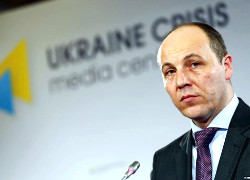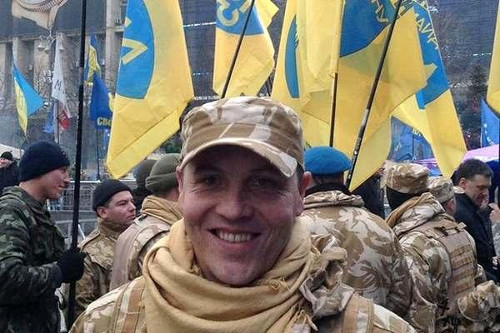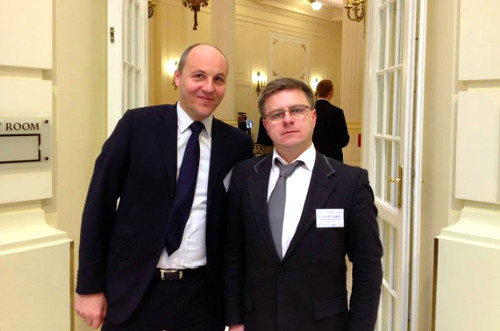Andriy Parubiy: FSB will act in Belarus much faster than in Ukraine
34- 16.12.2014, 13:01
- 110,671

Lukashenka has in fact surrendered Belarus's independence to Russia.
Andriy Parubiy, a deputy chairman of the Verkhovna Rada of Ukraine and former head of the National Security and Defence Council, said it in an interview with charter97.org. He took part in the 10th Eastern Policy Forum “Transatlantic Community versus Eurasia - Arising Challenges and New Opportunities” in Warsaw.
– A year has passed since the beginning of the Euromaidan protests. You were a commander at the Maidan camp and headed the National Security and Defence Council of Ukraine just after the overthrow of the Yanukovych regime several days before Russia's invasion of Crimea. What aims of the Maidan have been achieved and what hasn't been achieved?
– It's hard to speak about the Maidan in the past tense. I think it continues today. The aims are being implemented. We took to streets not just to support democratic freedoms and the European choice. It was the matter of the state's future. We understood that the refusal to sign the Association Agreement with the EU was the road to the Customs Union. We understood that if Yanukovych refused to sign it under pressure from Putin, Ukraine's integration into the Eurasian space and setting full control of the Kremlin over the country's internal and foreign policy would be the next step.
The aims set at the Maidan remain important, but we work to achieve them not at the Maidan, but on the eastern front. The main task is to defend the independence of the state. The main thing that inspired people to took to streets was that we are free citizens in the free country, no one has the right to say what we must do. It's still important today. We are defending these values in the east.
Of course, we have a number of other important issues, such as society democratisation, fight against corruption and carrying out reforms. Let me give you an example. We understood at the Maidan that we must defend ourselves from the Russian aggression and reset the authorities because we didn't have opportunities to carry out reforms and fight against corruption in the system created by Yanukovych. We held the presidential elections during the war and elected legitimate president of the country. It was a key step.

We understood that it was hard to carry out reforms with the Verkhovna Rada that didn't change since the ouster of Yanukovych. The Rada had the majority that voted for many laws that caused the Maidan protests. We held the early parliamentary elections during the war despite circumstances. The elections took place recently. It is the first time in the history of contemporary Ukraine that pro-European and pro-Ukrainian politicians – more than 300 MPs – have received a majority.
These are important steps, because it is impossible to carry out reforms without the foundation, without a mechanism. We haven't fulfilled all our plans, of course. It was hard to implement many things, because we had to fight and implement reforms simultaneously, though we adopted the law on the lustration.
We have more ambitious plans now. The defence of Ukraine's sovereignty and statehood is a global problem. Putin plans are bigger than just gaining control over Ukraine. We understand that we are on the front line defending the European values and civilised world.
– Is it possible to defend European values by cooperating with dictator Lukashenka?
– I'll try to explain it. The question about the survival of the state arose when the Russian aggression began. I'd like to remind you that after the Maidan's victory we saw Russian troops along our eastern border in addition to the aggression against Crimea. Regular troops were on the border near Donetsk, Kharkiv, Sumy and Chernihiv.
It was essential to understand if the border with Belarus would be the line of a possible attack. Oleksandr Turchynov met with Lukashenka for that reason. We could see at the bilateral talks if Lukashenka was ready to give his bases and territory to deploy Russian troops or he would refrain from attacking.
It was a life and death question. We didn't have any contacts with Moscow then. It was a boycott from Moscow at the level of the president and ministries. All communications and contacts were broken off. We understood that an attack could happen every day night. When we saw a possibility of contacts with Belarus, we used it. I learnt about the meeting after if had taken place, but I understood Turchynov.
– But you knew that Lukashenka had allowed Russian troops to use his bases and territory. Su-25 fighter jets, Mi-8 helicopters appeared in Belarus this year. Russian soldiers, who said they arrived “for rotation”, were seen in Homel.
– Yes, we know it. It raised our serious concerns. We understood that we could be attacked from the north or in the most unexpected direction, because Belarus borders with western Ukraine. We understood how the troops would look like if they were deployed along all possible directions. Lukashenka guaranteed that the territory of Belarus would not be used to attack Ukraine. It wasn't the key point for us, because we held our positions [on the Belarusian border], but it allowed us to concentrate more troops in the eastern direction. 100% guarantees seemed to be impossible, but even 80% guarantees gave us more space for maneuvering.
Belarusians should understand Ukraine in this situation. It is by no means a refusal to support democratic opposition. It is by no means a refusal to support reforms and changes in Belarus. It was important not to allow positions of Lukashenka and Putin to become one.

– Do you think they have different positions?
– I think Lukashenka is in a difficult situation. His policy of eliminating the national identity has led to the fact that he has found himself helpless in the face of the scenario that was implemented in Ukraine. He understands that if the Russian FSB and security services want to repeat the script in Belarus, it will take much less time than in Ukraine. He will be helpless when riots are organised and administrative buildings are seized under the guise of defending Russian-speaking people. He did everything to turn Belarus into a part of Russia instead of being an independent state.
As for relations between Kyiv and Minsk, I would separate tactical and strategical issues. Tactically, it was vital for Ukraine to defend its statehood and territory. But strategically, the support of democratic forces of Belarus continues to be our priority in relations with your country.
– You said at the beginning of our conversation that Ukraine has its first pro-Ukrainian Verkhovna Rada. You are the Vice Speaker of the Rada. How will the pro-Ukrainian and pro-European parliament differ from the previous parliament if we speak about relations with Belarus?
– Contacts between the states will be established, of course, because they touch on some issues other than politics. There are also economic and trade relations. Being the vice speaker of the Verkhovna Rada, I am ready to create a platform for system contacts with Belarusian opposition. It could be the platform for joint events and conferences.
The victory of Ukraine in the confrontation with Putin will also be the victory of Belarus and Belarusian opposition. It will be a strategic victory, but to gain it tactically we can use some approaches that some will probably not understand completely. If it helps achieve the final aim – the victory of Ukraine – it will be Belarus's victory, too, because the Putin regime will fall as a result. It will happen due to internal controversies through handing power over to a more pro-Western successor or through the decentralisation of Russia. It's hard to predict.
– As the head of the National Security and Defence Council, you were a consistent supporter of the hard-line position and said that talks with terrorists and Putin had no sense. After your resignation on August 7, the authorities of Ukraine began to promote the idea of negotiations. Terrorists do not implement the Minsk agreements that were signed in September. Does it has any sense to continue such talks?
- The National Security and Defence Council is not just a council that coordinates security bodies. It is an analytical centre that works out the strategy of united Ukraine. When Petro Poroshenko, whom I know for a long time, was elected president of Ukraine, he had the idea of solving the situation in Donbas peacefully. I didn't believe in it from the very beginning. I said only force was able to stop Putin. He will move further unless he is stopped. I didn't believe in a peaceful solution. It was a hot topic, because the Council was to prepare proposals for the peaceful plan. I understood that the secretary should share the president's views and implement them in practice. I respect the president and his concept, most Ukrainian citizens supported him at the elections, but I didn't share his position.
I understood that I could not do the things in which I didn't believe and could not argue in public amid war, so I chose to resign quietly. A common stance is the main thing for a successful struggle. Even today, though the president and I belong to different political forces, I say that we should stand together in the face of the external threat. Even if we have some controversies, we should solve them through talks, not through a conflict.
As for the talks, I can express my opinion. There was the Geneva format, involving the EU, the US, Russia and Ukraine. I think it was the only proper format, because the US, the UK and Russia guaranteed the independence of Ukraine when we withdrew our nuclear weapons. I know that Putin didn't like the format. He was looking for something else. As you know, rules determine the outcome of the game. Putin insisted on removing the US from the process.
So, we received the format in Minsk without the US but with those EU members that take the softest compromise position on Russia. It was the first step to make a farce of the agreements. Moscow's intention to represent terrorists as the third party leads to a deadlock. I know the background. I have always thought that it leads to nothing. It wasn't the plan of Ukraine. It was the plan of Russia.
It was important for Putin to represent terrorist organisations DNR and LNR as subjects to later show: look, Russia has no relation to it, because local organisations fight here. He needed to show that it is not the conflict between Russia and Ukraine, it is the internal Ukrainian conflict. This format gave him this opportunity. I was surprised to see Viktor Medvedchuk at the talks, who is Putin's influence agent in Ukraine. I have always been against this format of talks and agreements.
I'd like to repeat that being a government official, I respect the concept and position of the president, but I do not believe the Minsk talks will be successful. I don't believe we can reach another stage. I see the only positive thing – a break for us to equip our army. We need to understand clearly that the main task for Ukraine is to prepare the army so that we can deliver a lightning blow at dawn and expel Russian militants and occupants from our country.
– You have said at the conference in Warsaw that the “Russian world” will spread to other countries if Putin is not stopped. Does the West do enough to prevent it?
– Victory cannot be gained without the second front. Western countries, our allies, should destroy the financial empire of Putin. It will be difficult for us to carry out effective warfare as long as he owns limitless resources. What is happening to the Russian ruble and oil today as well as sanctions against Russia are very important for our victory. We hope that the West's measures against Putin will strengthen instead of weakening and that Europe's position will become harsher.









